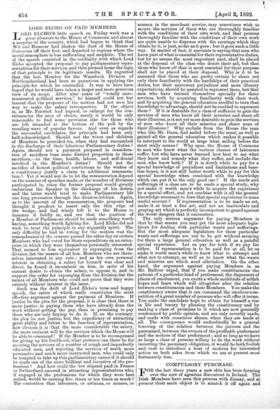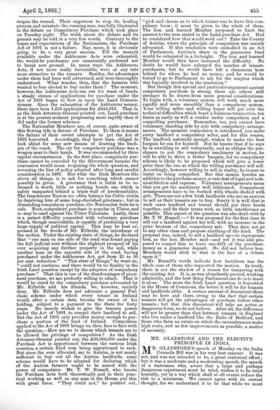COMPULSORY PURCHASE. F OR the last three years a new skin
has been forming over the sore of agrarian discontent in Ireland. The Irish Members have seen this process with dismay, and at present their main object is to scratch it off again and. reopen the wound. Their eagerness to stop the healing process and reinstate the running sore, was fully illustrated in the debate on Compulsory Purchase which took place on Tuesday night. The truth about the debate and its genesis may be told in a very few words. Contrary to the hopes and expectations of the Nationalists, the Purchase Act of 1891 is not a failure. Nay, more, it is obviously going to be a very great success. Till the moneys available under the Ashbourne Acts were exhausted, the would-be purchasers not unnaturally preferred not to break new ground. In many ways the Ashbourne Acts, if not more really favourable, were at any rate more attractive to the tenants. Besides, the advantages under them had been well advertised, and were thoroughly understood. What wonder, then, that the farmers who wanted to buy elected to buy under them ? The moment, however, the Ashbourne Acts ran out for want of funds, a steady stream of applications for purchase under the Act of 1891 began to flow in upon the Land Commis- sioners. Since the exhaustion of the Ashbourne money, there have been 1,253 applications for £444,612. That is, as the Irish Attorney-General pointed out, Land-purchase is at the present moment progressing more rapidly than it did under the former schemes.
The Nationalist Members are, of course, quite aware of this flowing tide in favour of Purchase. To them it means the failure of their covert attempts to get the Act of 1891 boycotted. Accordingly, they have been obliged to look about for some new means of drawing the linch- pin of the coach. The cry for compulsory purchase was a weapon near to their hands. It was recommended by three capital circumstances. In the first place, compulsory pur- shase cannot be conceded by the Government because the concession would mean reopening the whole question, and reversing the line of policy adopted after long and careful consideration in 1891. But what the Irish Members like above all things, is to ask for something which cannot possibly be given. A grievance that is liable to be re- dressed is worth little or nothing beside one which is safely ramparted behind a triple wall of irredressibility. The treacherous Teuton too often betrays his Celtic victim by depriving him of some long-cherished grievance ; but in demanding compulsory purchase, the Nationalist feels he is safe. Next, compulsory purchase is popular in Ulster, and so may be used against the Ulster Unionists. Lastly, there is a patent difficulty connected with voluntary purchase which, though unavoidable, is capable of producing a very large supply of political capital. This may be best ex- pressed in the words of Mr. Kilbride, the introducer of the motion. Under the existing state of things, he declared that "one man on one side of the road was found paying the full judicial rent without the slightest prospect of his ever acquiring any further property in the soil, while another man on the opposite side of the road, having purchased under the Ashbourne Act, got from 25 to 30 per cent. reduction." 'This state of things," he went on, "could not continue, and there would be no finality in the Irish Land question except by the adoption of compulsory purchase." That this is one of the disadvantages of piece- meal purchase, we are perfectly willing to admit. That it would be cured by the compulsory purchase advocated by Mr. Kilbride and his friends, we, however, entirely deny. Mr. Kilbride does not advocate a general Pur- chase scheme under which every tenant in Ireland would, after a certain date, become the owner of his holding, subject to a payment to the State for forty years. He merely wishes to give the tenants power under the Act of 1891 to compel their landlord to sell.
But the Act of 1891 only provides money enough to pur- chase a portion of the land of Ireland. Compulsion applied to the Act of 1891 brings us, then, face to face with the question,—How are we to choose which tenants are to be allowed the 'privilege of compulsion ? As the Irish Attorney-General pointed out, the £33,000,000 under the Purchase Act is apportioned between the various Irish counties, a certain fixed sum being apportioned to each. But since the sum allocated, say to Antrim is not nearly sufficient to buy out all the Antrim landlords, some scheme would have to be adopted for declaring which of the Antrim farmers ought to be armed with the power of compulsion. Mr. T. W. Russell, who knows the Purchase Acts both theoretically and in their prac- tical working as well as any man in the House, put this with great force. "They could not," he pointed out, "pick and choose as to which tenant was to have this com- pulsory boon ; it must be given to the whole of them. The hon. and learned Member proposed to limit the amount to the sum stated in the Land-purchase Act. Had he considered how that would work out ? Take the County of Antrim, where the principle of compulsion was mainly advocated. If this resolution were embodied in an Act of Parliament, Antrim's share in the guarantee fund would be exhausted in a fortnight. The hon. and learned Member would then have increased the difficulty. No doubt he would have enlarged the number of tenant- purchasers, but he would have left a clamorous host behind for whom he had no money, and he would be forced to go to Parliament to ask for the surplus which was logically involved in the resolution."
But though this special and particular argument against compulsory purchase is strong, there are others still stronger to be drawn from more general considerations. To begin with, a voluntary system will work much more rapidly and more smoothly than a compulsory system. Your willing seller and willing buyer will get over the technical difficulties which beset a business transaction, ten times as easily as will a vendor under compulsion and a compelling purchaser. Remember, too, you cannot have voluntary, standing side by side with compulsory, arrange- ments. The moment compulsion is introduced, you make every landlord a compulsory seller, and for this reason. The landlord, naturally enough, wishes to make the best bargain he can for himself. But he knows that if he says he is unwilling to sell voluntarily, and so obliges the pur- chasers to put the compulsory machinery in motion, he will be able to drive a better bargain, for no compulsory scheme is likely to be proposed which will give a lower price than the one at which the willing purchaser will sell. Accordingly, however willing to sell in reality, he is sure to insist on being compelled. But this means, besides an addition to the purchase-money, a vast deal of legal and tech- nical friction and expense. Voluntary arrangements mean that you get the machinery well lubricated. Compulsory arrangements have to be worked with wheels choked with grit. There are not a few Irish landlords who are as anxious to sell as their tenants are to buy. Surely it is well that in such cases landlord and tenant should put their heads together, and fix their terms with as little interference as possible. This aspect of the question was also dealt with by Mr. T. W. Russell :—" It was proposed for the first time to sell out a landlord against his will, with no increase in the price because of the compulsory sale. They dare not go to any other class and propose anything of the kind. The proposal was, indeed, to sell a landlord up—to expropriate him, as the hon. Member said—and yet it was also pro- posed to compel him to leave one-fifth of the purchase- money as a guarantee deposit. He did not believe hon. Members would stick to that in the face of a debate upon it."
Mr. Russell's words indicate how factitious was the whole case of those who supported the motion. In truth, there is not the shadow of a reason for tampering with the existing Act. It is, as was abundantly proved, working admirably, and the best thing Parliament can do is to leave it alone. The more the Irish Land question is boycotted in the House of Commons, the better it will be for tenants and landlords alike. A certain amount of discontent there may be here and there, owing to the fact that certain tenants will get the advantages of purchase before other tenants ; but that this discontent will take an active or dangerous form, we do not believe. After all, the difference will not be greater than that between tenants in England who live under a landlord like the Duke of Bedford, and those who farm an estate on which the encumbrances make high rents, and as few improvements as possible, a matter of necessity.



































 Previous page
Previous page